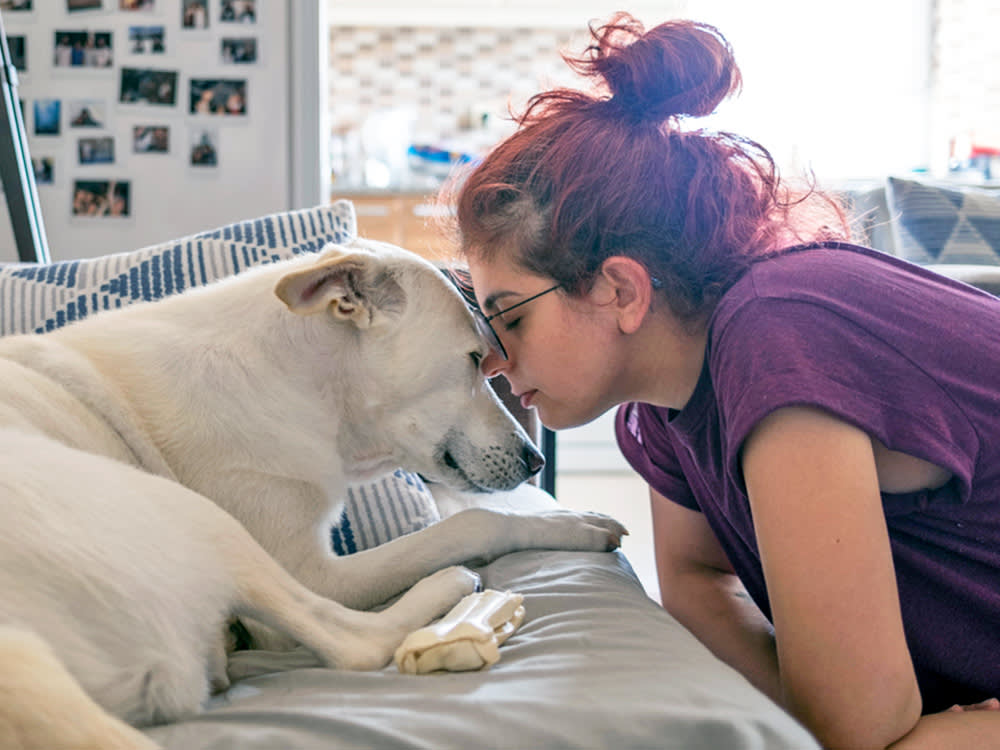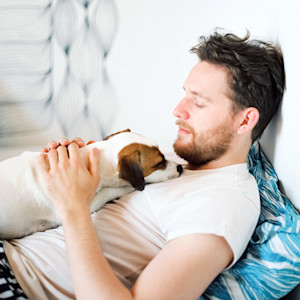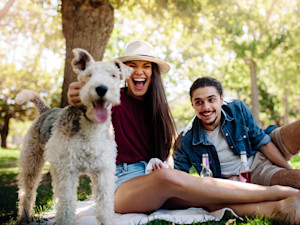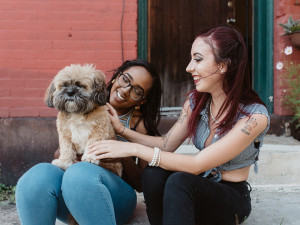Pets Are Better at Grief Support Than People, Study Says
For starters, they’re better listeners.

Share Article
When you’re in the thick of it, grief feels like an anvil tied around your ankles. It’s a familiar, weighty thing that we drag from room to room, and too often, no one knows how to talk about it. After a while, friends and family might ignore the big metal thing at your feet or even resent it.
They turn and walk away in the street, or they begin hinting that they miss the “old” you. It’s no wonder people sometimes turn to animals, who have been scientifically proven to be better at grief support than people.
Dogs are better at comforting grieving people than humans.
A 2021 studyopens in new tab published in the science journal PLOS ONEopens in new tab found that grieving participants were far more satisfied with the support they received from animals than from humans. The numbers are staggering. Out of 248 participants, 89 percent of those who received comfort from a pet or animal reported being either extremely or mostly satisfied. For comparison, online grief groups scored second highest with a much lower satisfaction rating of 67 percent.
Study author Joanne Cacciatore, a professor at Arizona State University’s School of Social Work, was not surprised by these results, given the anecdotes study participants had shared with her about the lackluster support they received from their own species.

“People talked about how when they started crying, human beings would literally turn away from them, or walk away, or tell them to go get a drink,” Cacciatore says. But animals were different. They were patient, generous, and non-judgmental — and, crucially, that did not change over time.
“If someone’s child dies, people do show up,” Cacciatore says. “But six months later, people go back to life as usual. It’s very hard to stay with even the concept that children can die.” Animals, on the other hand, were unwavering in their support.
“They came from the living room into the dining room and sat next to them and put their head in their lap,” Cacciatore says. While people tend to back away from grief, animals offer ongoing emotional acts of caring.
Pets are better at comforting you than your relatives.
The difference grievers felt with animals versus their loved ones is even more stark. While counselors and therapists came in third on the satisfaction ratings and in-person grief groups came in fourth, friends came in fifth with a satisfaction rating of only 52 percent. Family came next at 40 percent satisfaction.
“Human beings don’t know how to adequately provide that level of emotional support that’s so needed, especially by those who are some of the most vulnerable people — those who have suffered traumatic loss,” Cacciatore says. At some point, she added, “We have to be able to confront our fear and our terror of loss happening to us. It’s not contagious.”
Pet parents are probably not surprised to hear that animals are better at grief support than people. After all, who among us hasn’t confided in our familiar at one point or another? This study’s findings also jibe with prior research from other institutions.
Time and time againopens in new tab, scholars have provenopens in new tab that animals really do have quantifiable healing powers. Just ask the more than 200 emergency room patients who participated in a 2022 studyopens in new tab also published in PLOS ONE. Those who spent 10 minutes with a therapy dog reported less pain afterward than those who went without. Last year, another studyopens in new tab published in the psychology journal Emotion found that after a stress test, dogs relieved anxiety and boosted participants’ moods better than coloring or waiting for 10 minutes.
Grief-support skills are not limited to dogs and cats.
In the case of Cacciatore’s study, however, the benevolent animals were not just dogs or even cats. Participants also found solace in other animals like horses, goats, and pigs. In 2022, Cacciatore authored another study that examined the therapeutic effects of interacting with animals on a care farm — and, more specifically, learning about those animals’ traumatic histories.
When asked why animals can be so much more reassuring than humans, Cacciatore emphasizes their capacity for unconditional care. “Animals didn’t judge,” she says. “Animals didn’t rush. Animals didn’t try to change how the person who was feeling sad was feeling. They just showed up. It's almost too simple for human beings.”
Quotes from participants in the 2021 study highlight just how meaningful animal-human companionship really is. One person who lost a son said that sometimes during walks with their dog, “I talk to him about my son, and he has no choice but to listen because he’s a dog … a loving comforting animal.”
That, more than anything, is what Cacciatore believes all humans can learn from animals — especially when it comes to supporting the people we love through a devastating loss. “The way animals show up is really, not to sound fluffy, but in the heart space,” she says. “They show up without any expectation of changing our emotional state.”
In other words, animals have mastered acceptance — a virtue we could all stand to embrace more often, whether we’re grieving or not.

Laura Bradley
Laura is a New York-based experienced writer and mom of two rescue pups. Her work has appeared in Slate, Vanity Fair, Daily Beast, The Washington Post, The Atlantic, Yahoo! News, Vulture, Grazia Magazine, and more. When she is not writing or walking the pooches, you will probably find her in the community garden.
Related articles
![Man holding his small white dog in bed.]()
Pets Are the Best Medicine for PTSD—Here’s Why
Trauma can take many forms. Along with traditional therapy, animals are a great help.
![Happy couple outside with their dog.]()
Spending Time With Dogs Can Make You Better in Social Situations, Study Says
Especially if you pet them.
![Valentin Pujadas illustration]()
FYI, Pets Are Incredibly Good For Your Mental Health
Experts share the science-backed ways our pets offer us emotional support.
![A woman holding a cat close to her while sitting on a yoga mat.]()
Shockingly, Your Pet Will Enhance Your Mindfulness Practice
The next time they try to kiss your face while you’re in corpse pose, let them.
![two people bonding and smiling over a dog]()
Loneliness Is a Public Health Crisis. Pets Can Help
Per the US Surgeon General, loneliness is as dangerous for your health as smoking 15 cigarettes a day. Here are ways pets can solve that.
![two girls bonding over a cute fluffy dog]()
How 5 Pet Parents’ Lives Had a Glow-Up After They Got Their Pets
Turns out finding community isn’t so hard when you’ve got a cute pal to help get you out of the house.







